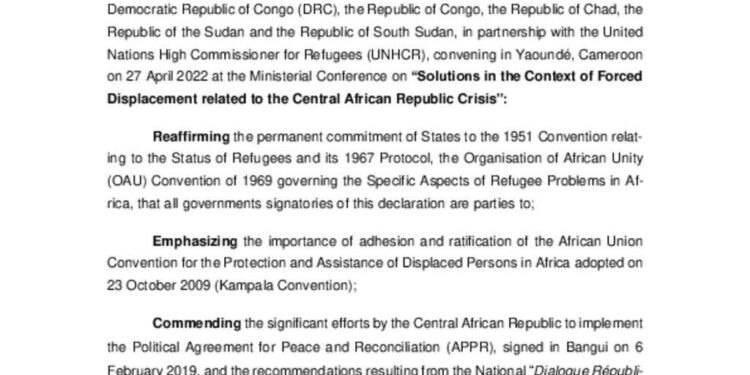OIC’s Yaoundé Declaration: A Renewed Commitment to Peaceful Conflict Resolution
In a decisive effort to promote stability and constructive dialogue across regions plagued by turmoil, the Organization of Islamic Cooperation (OIC) has reaffirmed its dedication to resolving conflicts through peaceful means with the adoption of the Yaoundé Declaration. Convening in Cameroon’s capital, Yaoundé, representatives from member countries emphasized the critical importance of collaborative approaches in tackling persistent challenges within the Muslim world. This declaration not only signals a unified stance favoring diplomacy over military intervention but also reflects an increasing alignment among OIC nations on prioritizing peace and security.
Amid escalating global tensions and ongoing disputes, the Yaoundé Declaration stands as a strategic blueprint for navigating intricate geopolitical issues. It advocates for cooperative engagement that could redefine how OIC members—and their partners—address conflict dynamics moving forward.
Promoting Diplomatic Engagement: Core Principles of the Yaoundé Declaration
The recently ratified Yaoundé Declaration marks a pivotal moment in Africa-focused peace efforts led by the OIC. Central to this document is an emphasis on fostering diplomatic dialogue as a primary tool for conflict resolution. The declaration calls upon member states to embrace inclusive negotiation processes involving all relevant parties, recognizing that enduring peace hinges on mutual respect for sovereignty and shared interests.
Key strategies outlined include:
- Enhancing Peacebuilding Programs: Encouraging investment in comprehensive initiatives aimed at addressing underlying causes such as poverty, inequality, and political exclusion.
- Establishing Communication Channels: Developing platforms where conflicting groups can engage transparently to build trust and reconciliation.
- Capacity Strengthening: Empowering local leaders and institutions with skills necessary for effective dispute management.
- Cultivating International Partnerships: Leveraging support from global organizations like the United Nations and African Union to bolster peace efforts.
This framework underscores not only OIC’s commitment but also serves as an urgent appeal for collective action rooted in unity and cooperation among Islamic nations. By acknowledging both regional complexities and aspirations toward peaceful coexistence, it sets forth actionable pathways toward sustainable harmony.
Synthesizing Solidarity: Insights from the Recent OIC Summit
The latest summit held in Yaoundé reinforced OIC’s resolve to deepen solidarity among its members through coordinated responses aimed at stabilizing volatile regions. Discussions highlighted immediate interventions alongside long-term strategies tailored towards hotspots such as Sudan—where recent clashes have intensified—and other areas experiencing unrest within Muslim-majority countries.[source]
The declaration delineates several practical measures designed to fortify intra-OIC collaboration including:
- Create Tailored Conflict Resolution Frameworks: Develop mechanisms sensitive to specific regional contexts ensuring more effective mediation outcomes.
- Cultivate Stronger Bilateral & Multilateral Relations: Enhance partnerships between member states facilitating joint initiatives across political, economic, and social spheres.
- Cultural Exchange Programs: Promote intercultural understanding through educational exchanges that bridge divides between diverse communities within member countries.
- Create Dedicated Peace Funds: Establish financial resources supporting grassroots organizations actively engaged in peacebuilding activities.[source]
| >Initiative< | >Purpose< |
|---|---|
| >Conflict Resolution Mechanisms< | >Effectively mediate localized disputes< |
| >Bilateral & Multilateral Cooperation< | >Strengthen collaborative frameworks among members< |
| >Cultural Exchange Initiatives< | >Build mutual respect through shared experiences< |

